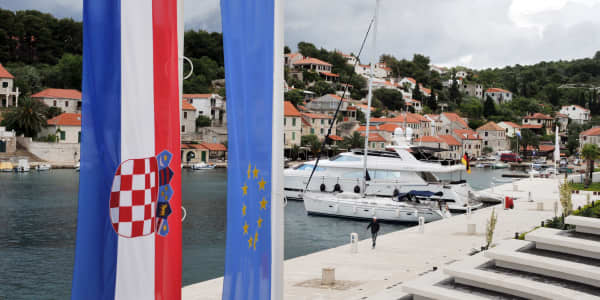Europe's emerging economies are keen to promote their cultural heritage to bolster their tourism numbers – and their economic growth. However, concern is mounting among eastern Europeans that some promotional efforts – such as vampires, communism and hedonistic bachelor breaks – are stereotyping the region and drawing the wrong sort of crowd.
Tourism data from the European Union's (EU) statistics agency, Eurostat, show the number of hotels and "similar establishments" has risen in Latvia, from 321 in 2006 to 496 in 2011. Romania, likewise, saw its accommodation provision for tourists increase from 4,125 to 4,612 over the same period while in Poland, the number of establishments catering to tourists increased from 2,301 to 3,285.
Tourism accounts for more than 5 percent of the 28-nation EU's gross domestic product (GDP), according to the European Commission's Directorate-General for Enterprise and Industry.
As emerging affluent middle classes from countries like China, Russia and South America become increasingly well-traveled, here's a look at what emerging Europe is doing to attract the tourism dollar:
Bachelor parties
Although the booze-addled memories of many a pre-wedding bachelor party trip – or "stag do" -- are usually a bit of a blur for most people, many businesses in emerging European economies Latvia, Lithuania and Estonia have been quick to cash in on the more hedonist breed of tourist to create a break to remember.
The Baltic cities of Riga, Talinn and Vilnius have become synonymous with stag trips with a large number of tour companies offering all-inclusive trips featuring outdoor activities such as shooting trips, bar-crawls and strip clubs.
The hangover from such trips has not been confined to the stag alone, however. Locals complain that all-male party trips to their capitals mean routine rowdiness and disorder.
(Read more on Emerging Europe: Bringing Serbia in from the cold? EU talks begin)
The Latvian Tourism Development Agency was not able to provide CNBC with exact tourism figures relating to the stag-do sector, but data from the Central Statistical Bureau of Latvia showed that the number of UK visitors to Latvia had more than doubled over the last 10 years, to 37,960 in 2012.
Maksims Tolstojs, chairman of Riga's City Development Committee, told CNBC that while local tourism had contributed to Latvia's growth rate (in the third quarter of 2013, the country's economy expanded 3.9 percent from a year earlier) stag parties had brought their fair share of problems.
"The 'stag do industry' has two sides. Of course – if more people are coming to Riga both the city and those working in [the] tourism industry, earn more money. But of course it has also brought some disorder in the city," Tolstojs told CNBC.
The businesses benefiting from such visitors are not complaining. Ieva Grinberga, the manager of a popular stag do haunt called Donegan's Pub in Riga, told CNBC that bachelor parties were great for business.
(Read more on Emerging Europe: What to pick and avoid in Emerging Europe for 2014)
"We get a lot of stag dos and they are always a lot of fun," she said. "It's a good thing for business and it's a good thing for the city," she said, adding that the pub's revenues were certainly boosted by bachelor parties.
Riga has created a special police unit just to tackle stag-do related disorder, Tolstojs said, not only due to drunken stag do parties but local criminals who had increasingly looked to exploit groups of inebriated men ready to flash the cash during the trips.
The 'Dracula Project'
While cultural assets are what every tourism board tries to sell to the international tourist – there are some parts of a country's history that raise fears of stereotyping and relying on clichés.
A more blood-curdling part of Romania's past that has long courted controversy is set to be revived.
Launching "The Dracula project" in summer 2013, Romania's tourism board said it was going to develop "vampire tourism" in earnest both as a way to boost economic growth in Transylvania, the legendary home of the vampire, and nationwide.
Announcing the launch, national news agency Agerpres cited Dan Matei Agathon, the president of the Romanian tourism employers' federation, as saying "the Dracula myth represents an unrivalled vehicle for promoting tourism."
Tourism numbers for Romania are increasing, with the latest figures available for November 2013 showing a total 126,658 of foreign visitors, up from the same period the previous year when the total amount was 118,430, according to the Romanian National Institute of Statistics. In the same month in 2011, the number of foreign visitors was 111,000 and in 2010, the total was 100,029 so numbers are certainly on the rise, all helping to contribute to Romania's economic growth.
(Read more on Emerging Europe: Emerging Europe's real problem? Politicians)
In the third quarter of 2013, Romania posted a 1.6 percent increase in growth from the previous quarter and a 4.1 percent rise from the same period a year earlier, according to Eurostat. Looking to exploit a period of economic prosperity, the Romanian tourist board is promoting the Transylvanian medieval fortress Bran Castle.
The castle is said to have inspired the setting for Irish writer Bram Stoker's 19th century novel "Dracula" and the novel's lead character is thought to have been based on real-life medieval Romanian prince Vlad Tepes or Vlad Dracul -- also known by the cheery name "Vlad the Impaler" -- who lived near the castle 600 years ago.
The move to exploit such an association is not without opposition with Tepes being seen as something of a national hero in Romania as he fought off Ottoman invaders in the middle ages.
An initiative by the Romanian tourism board to develop a "Dracula" theme park a decade ago failed and Bran Castle's administrators are certainly keen that visitors separate fact from fiction, telling visitors to their website that they "should make the distinction between the historic reality of Bran and the character of the Count in Bram Stoker's novel. Dracula exists in the imagination."
Razvan Marc, director of the Romanian National Tourist Office in London, told CNBC that while there were certainly plans to promote "Dracula tourism" in Romania, nothing concrete had yet been put in place. He added, however, that a number of private tour companies were already offering Dracula tour packages.
Cashing in on communism
The "Iron Curtain" and Berlin Wall fell back in 1989 but emerging Europe's communist past has long been a draw for tourists intrigued to learn more about life during the era.
So-called "Communist tours" have sprung up in countries including former Soviet Romania, Bulgaria and Poland. In these countries the physical remnants of communism can still be seen – from Soviet-style buildings to the Trabant motor car which was once an ubiquitous automobile in the communist bloc.
One tour company has been offering tourists a time warping journey into Poland's communist past is Crazy Guides which has operated in the capital Krakow for the last eight years. In its "Communism Tour", holidaymakers are driven around in a Trabant to see communist sights around the city while hearing stories about life under the regime.
Michal Ostrokski, who founded Crazy Guides in 2004, said he wanted to create a niche tour that was historical but not "too heavy" politically.
"The thing we're famous for in eastern Europe is communism so it became an obvious choice. The main thing was to do something fun and take a different attitude to tourism," he told CNBC, adding that a couple of thousand people take the tours each year.
(Read more on Emerging Europe: EU's Russia problem? Latvia dismisses 'dirty money' claims)
Kuba Bialich, the company's manager, stressed that the tours were meant to be fun and an increasing number of Polish people were joining them, showing that the economic boost from tourism was domestically-driven too.
"They are not just for foreigners coming on the tours," Bialich said. "More and more Polish and Krakow citizens also take the tours to remind them of their youth."
Patrick Eveno, president of the World Tourism Experts Association, told CNBC that such diverse methods of attracting tourists create "the necessary buzz for a new tourism destination." However, he added a cautionary remark that be it vampires or communism, portraying a one-sided picture of a nation's past or cultural heritage can be risky.
"But they [operators and tourism boards] must be careful because this kind of tourism can create an indelible image of the destination as either "a vampire country" or a country where tourists can only see 'an old style system'," he said.
"Success in cultural tourism for emerging countries is to create and invent tourism using cultural heritage in conjunction with [the more traditional 'church and castle' foundation]," he added. "This type of cultural tourism [provides] for a strong, sustainable and positive image."
- By CNBC's Holly Ellyatt, follow her on Twitter @HollyEllyatt





